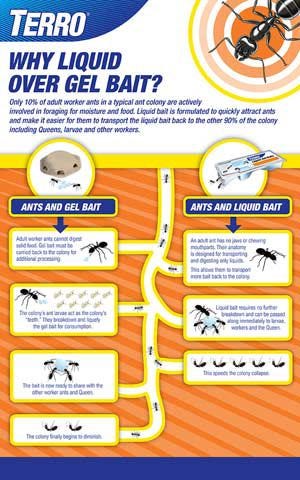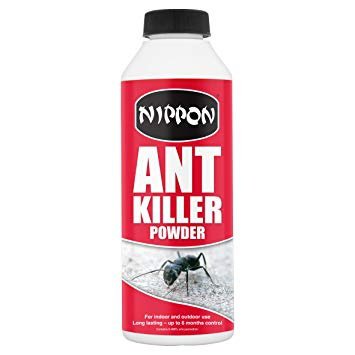Consuming ant poison can be fatal to humans, especially if ingested in large amounts. The toxicity varies depending on the active ingredients present in the product.
Ant poisons often contain chemicals such as borax, abamectin, fipronil, or hydramethylnon, which can pose serious health risks when humans are exposed to them at high levels. Symptoms of poisoning can include nausea, vomiting, dizziness, and in severe cases, respiratory failure or coma.
While small, accidental ingestions might result in minor symptoms, it is crucial to handle these substances with care and keep them out of reach from children and pets. Immediate medical attention is essential if someone ingests ant poison. By understanding the dangers and using ant poisons responsibly, we can prevent accidental poisonings and safeguard our health.

Credit: www.terro.com
The Toxic Ingredients In Ant Poison
The Toxic Ingredients in Ant Poison often go unnoticed but can pose significant risks. It’s essential to know what chemicals are in these products. This can help prevent accidental poisoning in humans and pets. Let’s explore these toxic ingredients and understand their potential dangers.
Common Chemicals Used
Ant poisons contain various chemicals to effectively kill ants. These ingredients should be handled with care:
- Boric Acid: It disrupts ants’ digestive systems.
- Fipronil: Targets nerve function in ants.
- Hydramethylnon: A slow-acting poison that ensures distribution.
How Poison Affects Ants
Ant poison is designed to be attractive and deadly to ants. Here’s how it works:
| Chemical | Effect on Ants |
|---|---|
| Boric Acid | Ants ingest it, and it disrupts their stomachs, causing death. |
| Fipronil | Affects the nervous system, causing paralysis and death. |
| Hydramethylnon | Interferes with cellular energy production, leading to death. |

Credit: animalpoisons.com.au
Assessing The Risks To Humans
Exploring the hazards ant poison poses to people unfolds a tale of caution versus complacency. Various ant poisons, marketed for their lethal punch against pests, could potentially harm humans. The key lies in understanding how and to what extent.
Concentration And Dosage Parameters
It’s vital to grasp the toxic levels of ant poisons we may encounter. The potency of these substances hinges on their concentration — higher levels entail increased risk. Dosage, too, mirrors this danger; small amounts may only cause minor symptoms, yet larger doses can be critical. Those handling ant poison must do so with utmost care, ensuring they adhere to safety guidelines.
Accidental Ingestion Scenarios
Imagine a child finding ant poison; the scenario turns precarious swiftly. Accidents can occur despite prevention efforts. Ingesting small amounts can lead to stomach pain or vomiting. Immediate medical attention is crucial. Keep poisons away from reach and clearly label storage areas to mitigate such risks.
Consider pets that may stumble upon these toxins. Their risks align with humans’, pressing the need for prompt veterinary care if ingestion happens. Homes with curious pets must strategically place ant poisons to avoid tragic mishaps.
What about adults? An adult may mistake ant poison for food or drink. This error can result in serious health issues. Always keep ant poisons in original containers, away from food areas, to prevent such dangers.
| Poison Type | Safe for Humans (Yes/No) | Risk Level |
|---|---|---|
| Bait Stations | Yes | Low |
| Granules | No | High |
| Sprays | No | Moderate |
- Always use gloves when handling ant poison.
- Do not eat or drink near ant poisons.
- Teach children about the dangers of poisons.
- Store ant poisons in secure, clearly-marked locations.
Human Exposure To Ant Poisons
Ant poisons are common in households and gardens. They target pesky ants but can pose risks to humans if mishandled. Understanding the effects of human exposure to these chemicals is crucial. It helps keep your family safe.
Direct Contact And Inhalation
Accidents happen, and direct contact with ant poison is one such case. Skin contact might lead to irritation or allergic reactions. Always wear gloves when handling these substances. Washing hands immediately after use is vital.
Inhaling ant poison fumes can be dangerous too. This often happens during spray application. Take these steps to stay safe:
- Use ant poisons in well-ventilated areas.
- Wear a mask to avoid inhaling fumes.
- Follow product instructions closely.
Indirect Exposure Through Environment
Indirect exposure occurs when ant poisons enter our surroundings. They can reach us through contaminated soil, water, and even air.
To minimize risks:
- Store ant poisons securely.
- Avoid overuse around home gardens.
- Keep an eye on local wildlife for unusual behavior.
Children and pets are particularly at risk for indirect exposure. Keeping products out of reach is critical. Check your home for any residues that might affect their health.
Symptoms Of Ant Poison Ingestion In Humans
Exploring the dangers of ant poison reveals surprising risks. Unintentional consumption can lead to severe symptoms. Being informed could save lives. Let’s uncover the symptoms one might experience after ingesting ant poison.
Immediate Physical Reactions
Ant poison can provoke instant physical symptoms. Recognizing these early signs is crucial.
- Burning sensations in the mouth and throat
- Intense stomach pain and cramps
- Vomiting and diarrhea
- Sudden onset of dizziness or headaches
- Rapid breathing difficulties
Long-term Health Implications
Long-lasting effects from ant poison are not to be overlooked.
| System Affected | Possible Long-term Effect |
|---|---|
| Digestive System | Chronic gastritis, ulcers |
| Nervous System | Neuropathy, cognitive impairments |
| Respiratory System | Chronic breathing problems |
| Cardiovascular System | Irregular heartbeat, hypertension |
Treatment Options For Ant Poison Ingestion
Exploring the treatment options for ant poison ingestion is critical for safety. Various ant poisons contain different chemicals. Each type requires its unique treatment approach. Swift action can mitigate potential risks to health.
First Aid Measures
Immediate action can save lives after ant poison ingestion. Follow these steps:
- Do not induce vomiting: It can cause more harm.
- Check for breathing and responsiveness.
- Call emergency services without delay.
- Provide details about the poison and amount ingested to professionals.
Medical Treatment Strategies
After first aid, doctors will take over:
- They assess symptoms and check vital signs.
- Tests might be done to determine the poison type.
- Activated charcoal may be used to prevent absorption in the stomach.
- Antidotes counteract specific poisons if available.
- Supportive care addresses symptoms like seizures or breathing problems.
Credit: www.quora.com
Preventative Measures To Avoid Accidents
Preventative Measures to Avoid Accidents play a crucial role in keeping our homes safe. Using ant poison requires careful handling. There are ways to make sure accidents do not happen. Families, especially those with kids and pets, must be aware. Let’s explore how to store these products securely and consider non-chemical alternatives.
Safe Storage Practices
To ensure safety, follow these storage tips:
- Lock it up: Keep poisons in a locked cabinet.
- Original containers are best: Never transfer poisons to other containers.
- Out of reach: Store high to prevent kids’ access.
- Seal tightly: Close lids firmly to prevent leaks.
By adhering to these practices, risk reduces significantly.
Alternatives To Chemical Poisons
Consider these non-chemical methods to combat ants:
| Type | Description |
|---|---|
| Essential Oils | Ants dislike peppermint and tea tree oils. A few drops act as a deterrent. |
| Diatomaceous Earth | A natural powder that harms ants but is safe for humans and pets when food-grade. |
| Borax and Sugar Mix | A mixture that targets ants’ exoskeletons and digestive systems safely. |
These alternatives provide peace of mind while being eco-friendly.
The Role Of Poison Control Centers
When it comes to potential poisonings, Poison Control Centers play a crucial role in both emergency response and prevention education. Their expertise becomes particularly significant with substances like ant poison, which contain chemicals that can be hazardous to humans if ingested or improperly handled.
Emergency Response Protocols
Poison Control Centers are pivotal in swiftly addressing poison exposures. They offer immediate guidance over the phone through their 24/7 hotlines.
- Assess the situation quickly.
- Provide step-by-step instructions to reduce harm.
- Coordinate with local emergency services if needed.
Operators are trained to ask the right questions. They determine the best course of action for each unique case of ant poison exposure.
Educational Resources For Prevention
Poison Control Centers do more than just respond to emergencies. They proactively educate the public about poisons.
- Provide preventive tips on safe storage of poisons.
- Teach the importance of label reading before use.
- Share guidance on what to do if exposure occurs.
Resourceful websites and informative pamphlets offer easy access to knowledge. They aim to prevent poison incidents from happening.
Legal Regulations Governing Ant Poisons
Welcome to our exploration of the legal regulations governing ant poisons. These laws ensure that the public remains safe from potentially harmful substances. When discussing something as serious as poison, understanding these regulations is crucial for both manufacturers and consumers.
Standards And Safety Guidelines
The world of ant poisons is closely regulated to safeguard human health. Here’s what you need to know:
- Ingredient disclosure is mandatory for all ant poison products.
- Concentration levels of active substances are capped for safety.
- Labels must provide clear instructions on safe usage.
- Protective packaging prevents accidental exposure.
Agencies such as the EPA in the U.S. set strict guidelines on these aspects.
Enforcement And Compliance
To ensure these standards are met, robust enforcement is in place:
- Regular inspections take place at manufacturing facilities.
- Companies face hefty fines and sanctions for non-compliance.
- Product recalls protect the public from unsafe products.
- Certification processes verify product adherence to safety standards.
These measures help keep dangerous ant poisons out of reach, preventing harm to the public.
Frequently Asked Questions On Can Ant Poison Kill You
Is Ant Poison Lethal To Humans?
Ant poison, designed for insects, typically contains low toxicity levels for humans. However, ingesting large amounts could be harmful and potentially fatal. Seek medical attention immediately if consumed.
Can Skin Contact With Ant Poison Be Dangerous?
Skin exposure to ant poison can cause irritation or allergic reactions. It’s not usually life-threatening, but washing the affected area thoroughly is important. Consult a doctor if symptoms persist or worsen.
What Are The Symptoms Of Ant Poison Ingestion?
Symptoms can include nausea, vomiting, diarrhea, stomach pain, dizziness, and headache. In severe cases, difficulty breathing and loss of consciousness can occur. Prompt medical treatment is essential.
How Much Ant Poison Is Considered Toxic?
The toxicity threshold depends on the poison’s active ingredients. Even small amounts ingested by children or pets can be dangerous. Always store ant poison out of reach and follow usage instructions carefully.
Conclusion
Understanding the risks of ant poison to human health is crucial. Proper use and storage are essential to avoid accidental ingestion. While typically not lethal to humans in small amounts, always exercise caution. Seek immediate help if exposure occurs. Stay informed, stay safe.

I’m MD Tanvir, and I bring years of expertise gained from working closely with pest control companies to the forefront. My journey in the industry has inspired me to launch Bug Battler, a platform aimed at equipping people with the know-how to combat pests autonomously. Through Bug Battler, I aim to empower individuals with practical insights to tackle pest infestations effectively.

